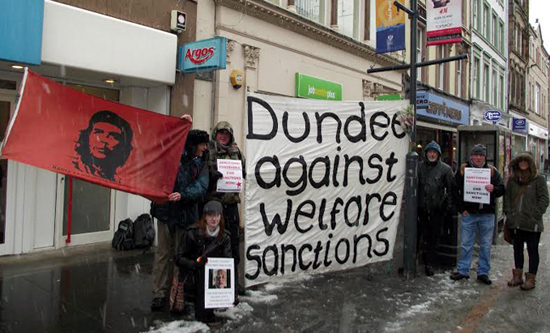As Scotland’s poor face another desperate winter forced to choose between heating or eating in order to live, the Scottish National Party (SNP) government’s promises of social justice are wearing thin.
Severe poverty is defined as those living with household income below 50% of UK median income. In 2014/15 this equated to £237 per week before housing costs (£12,358 per year) and £202 per week after housing costs (£10,533 per year). According to the latest statistics for 2014/15 the rates of severe poverty in Scotland stand at 12% of the population (630,000 people) after housing costs (Severe Poverty in Scotland: Communities Analysis report, August 2016). This includes 130,000 children, 10,000 more than the previous year.
Contrast this with the wealth of Scotland’s elites. According to Barclays annual prosperity map there were 43,000 millionaires in Scotland in the year to April and Scotland saw the biggest increase to household wealth of any area of the UK in 2015. The average house price in 49 of Edinburgh’s streets has shot up to £1 million, according to a new rich list, with 15 of Glasgow’s streets boasting the same. Edinburgh remains the key financial centre in Scotland and talk of a second independence referendum expresses an impossible wish to retain privileges and business in the European Union following Brexit.
For the mass of Scottish society a mix of welfare cuts, poverty pay and rising costs of living are squeezing ever greater numbers of people. The Trussell Trust charity statistics show that 63,794 three-day emergency food supplies were given to people visiting food banks in Scotland between April and September 2016. The UK figure for the same period was 519,342, of whom 188,584 were children. The Trust says it is on course to distribute the highest number of food parcels in its 12-year history during 2016-17.
A punitive system of welfare which stigmatises and starves the poor and vulnerable has become the norm. Benefit delays, changes and stoppages – of up to three years for a third sanction – mean starvation; these were the main reasons for referrals to Trussell Trust food banks with low income the second main reason. One in four of all referrals were driven by problems such as low pay, insecure work or rising costs. The introduction of the reduced benefit cap from 7 November which lowers the maximum benefit parents can receive in Scotland to £20,000 per annum will hit 6,733 households and will drive even more families to food banks to survive.
The latest figures also show that 845,000 households – or 35% of homes in Scotland – are living in fuel poverty and almost half of those affected are pensioners. The report by the Scottish Fuel Poverty Strategic Working Group published on 24 October also highlights that 9.5% (229,000 households) are living in extreme fuel poverty and that the poorest 30% have been hit hardest by the 185% rise in energy prices between 2003 and 2013. The report also states that the ‘high rate of fuel poverty is largely unchanged since 2009, and has doubled since the Scottish Government’s fuel poverty target was set in 2002.’ The SNP has been the main party in the Scottish government since 2007.
The weakness of response from the SNP exposes their complicity in austerity. It will not support a campaign of non-compliance with the DWP rules which could prevent up to 13,000 people a year having their benefits sanctioned in Scotland. The only SNP-led council in Scotland is in Dundee where £23m cuts to jobs and services were passed and are being implemented over 2016/17. In Edinburgh £85m cuts are being implemented by the joint SNP/Labour city council. It is clear that the SNP are prepared to play politics blaming Westminster at the expense of the Scottish working class. On 4 November the Rail, Maritime and Transport union (RMT) picketed SNP offices in Aberdeen demanding that Transport Minister Humza Yousaf ‘end the modern day slavery’ on Scottish waters. Foreign workers on Northern Isles Seatruck cargo vessels were being paid below £4 an hour when the legal minimum wage for those over 25 years old is £7.20. These shipping contracts are under the control of the SNP administration.
Dominic Mulgrew
Fight Racism! Fight Imperialism! 254 December 2016/January 2017




